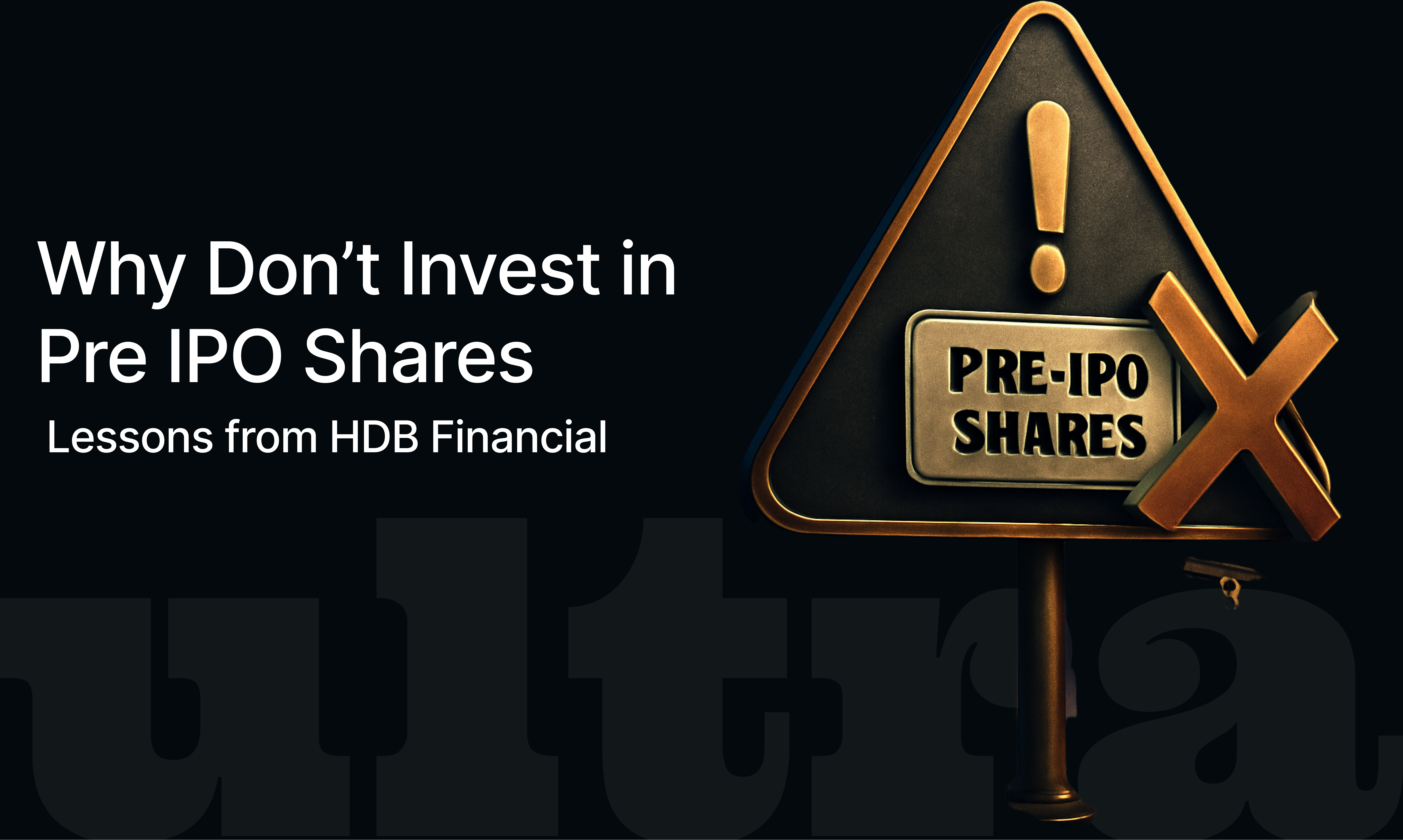Don’t Invest in Pre-IPO Shares: Lessons from HDB Financial
22 August 2025 · Sachin Gadekar
Even fundamentally strong businesses like HDB Financial can fail in the pre-IPO market—learn why hype-driven investing can be risky.

Introduction
Investing in pre-IPO shares has always carried a certain allure. The promise is simple — buy into a company before it lists, and potentially reap massive returns once it hits the stock market. However, history shows that pre-IPO shares are often riskier than they appear, and the story of HDB Financial Services perfectly illustrates this caution.
The HDB Financial Story
HDB Financial, a subsidiary of HDFC Bank, is a fundamentally strong business with steady growth, sound financials, and brand credibility. Many investors assumed that buying its pre-IPO shares would be a guaranteed path to profits.
However, the pre-IPO market works differently from listed equity markets. Limited supply, speculative demand, and hype often push prices far beyond reasonable valuations. In the case of HDB Financial:
The pre-IPO shares were highly sought after due to the company’s strong brand.
Retail investors were driven by hype rather than fundamentals.
Despite strong business metrics, prices were artificially inflated.
Why Pre-IPO Shares Are Risky
Investors often overlook the risks of pre-IPO investments. Here’s why they can be dangerous:
Overvaluation
Pre-IPO shares often trade at prices far above their intrinsic value. Hype-driven demand can inflate valuations, leading to unrealistic expectations.
Illiquidity
Unlike listed shares, pre-IPO shares are difficult to sell. Investors may get stuck with shares they cannot exit until the IPO, often at a lower price.
Regulatory Grey Areas
Pre-IPO markets lack the transparency and investor protections that stock exchanges offer. Financial reporting, disclosures, and audit standards can vary, leaving investors exposed.
Uncertain IPO Timelines
Delays in listing can negatively impact sentiment. Even strong businesses like HDB Financial can see pre-IPO share prices collapse if IPO timelines are unclear.
Lessons from HDB Financial
The HDB Financial pre-IPO episode teaches several critical lessons:
Strong fundamentals ≠ guaranteed pre-IPO profits
Hype-driven demand often traps retail investors
Transparency and liquidity are key for safe investing
Even the best businesses can underperform in the pre-IPO market if valuations are not aligned with fundamentals.
Word of Caution for Investors
Investors should approach pre-IPO opportunities with caution:
Avoid chasing hype or popular narratives.
Evaluate the business’s fundamentals, not just brand or market buzz.
Consider liquidity and exit options before committing significant capital.
Smarter Alternatives
Instead of blindly chasing pre-IPO shares, investors can explore regulated, transparent, and diversified opportunities, such as:
Listed equities with strong fundamentals
Bonds and fixed-income instruments
Alternative assets with clear exit strategies
FAQs
Q1: Are pre-IPO shares profitable?
A: They can be, but profitability is highly uncertain. Overvaluation, illiquidity, and IPO delays can erode potential gains.
Q2: Why did HDB Financial pre-IPO fail?
A: Despite strong fundamentals, hype-driven prices, limited liquidity, and uncertain IPO timelines caused the pre-IPO market to collapse.
Q3: Is it safe for retail investors to buy pre-IPO shares?
A: Retail investors face significant risks due to limited transparency, difficulty exiting positions, and overhyped valuations.
Q4: What should investors check before considering pre-IPO shares?
A: Evaluate fundamentals, historical financials, liquidity options, and realistic pricing versus the company’s intrinsic value.
Q5: What are safer alternatives to pre-IPO investments?
A: Listed equities, bonds, regulated alternative investments, and diversified portfolios are safer, transparent options.
Conclusion
The story of HDB Financial is a clear reminder that pre-IPO shares, no matter how fundamentally strong the business, carry risks. Hype, overvaluation, and limited liquidity can turn even the most solid companies into cautionary tales for investors.